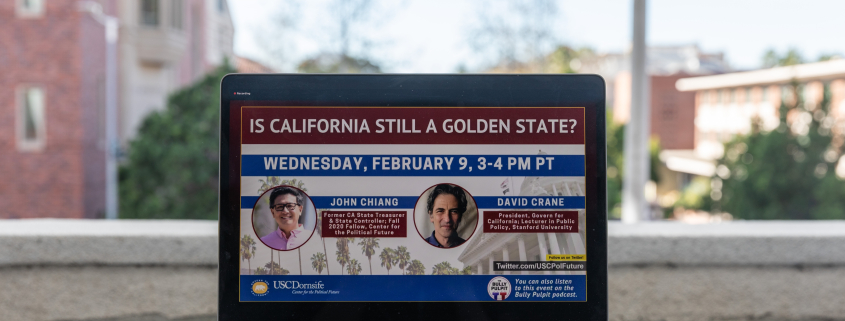‘Is California still a Golden State?’

USC Dornsife’s Center for the Political Future posed the question, “Is California Still a Golden State?” at a webinar Wednesday, held in partnership with Govern for California, to discuss the impact of state policies and the rhetoric surrounding California residents exiting the state in recent years.
This discussion was held between Govern for California president and Stanford University lecturer David Crane and former California State Treasurer, State Controller and Fall 2020 Fellow for CPF John Chiang. The event was moderated by CPF director Bob Shrum and co-director Mike Murphy.
CPF hosts the Political Conversations series under the Dornsife College of Letters, Arts and Sciences’ political science and international relations department and has partnered with more than 50 other organizations both on and off-campus to present students with diverse perspectives in these civil discussions. Govern for California, the partner organization for Wednesday’s event, is a political philanthropist network with chapters throughout the state that support candidates for state legislature deemed capable of winning their elections and willing to govern in accordance with their constituents.
In an interview with the Daily Trojan, CPF Executive Director Kamy Akhavan said he hopes the event provided some perspective to the questions of whether “our state is on the rise or on the decline.” Akhavan said the question on the minds of moderators and attendees is whether state policies or people’s preferences are causing the changes that California is currently undergoing, such as the increase in the state’s unhoused population, companies, such as Tesla, moving out of the state and the upward trend of residents leaving.
“What we’re trying to do is to bring the rigor of USC as an academic institution and combine it with practical politics,” Akhavan said. “We can have civil dialogue and look to find solutions to our society’s real world problems — not theoretical solutions, but actual solutions from people who are working in the field, and all our events are geared to deliver those outcomes.”
As the conversation began, Crane was the first to directly answer the question of if California is still a golden state, saying “the answer is undoubtedly, yes.”
“The reason that California has become less well-governed than it used to be; part of it is this dramatic growth, and probably the most complex population in the country, if not the world,” Crane said.
Much of the conversation in the webinar followed this two-pronged approach. The speakers expressed a general reverence toward California and acknowledged the massive amounts of revenue generated by the state but also acknowledged the misutilization of this wealth in services like education and Medi-Cal.
“5.9 million kids are in California public schools, and despite a doubling in spending per pupil over the last decade, not only is performance no better, but their lives are worse,” Crane said. “We’ve got nearly 15 million people on Medi-Cal who have greater access, but they don’t have better health, necessarily.”
Crane said he attributes this observation to the monopolization of the education code and poor incentives for hospitals to provide improved healthcare services, despite having higher operating earning margins.
Shrum said a large source of this revenue is California’s state income taxes, which are the highest in the nation, along with the state’s exceptionally high sales tax.
“A lot of people allege that this is driving residents and businesses out of the state,” Shrum said.
In response, Chiang said that while high taxes might contribute to some people leaving the state, other factors — such as high housing, living costs and other services — are larger contributors.
“It was the difficulty of retaining staff here because of the cost of housing, the cost of living, the transportation that some of the school districts that their kids went to weren’t the highest performing,” Chiang said. “We still have to do a better job in regards to providing services.”
Crane, on the other hand, said the reason for much of California’s shortcomings comes down to the idea that California has “largely been dominated by special interests.” If the state legislature were better protected against special interests, he said, “California can be golden again.”
Crane said that Gov. Gavin Newsom would pass pension reform and increase postemployment benefits — two progressive policy priorities — if he believed the state legislature would vote for it, but that he can’t without its support.
Aaron Goode, an attendee of the event, said that though he enjoyed the event, he had hoped the speakers would talk more about other “governance-related issues pertaining to California,” such as campaign finance reform and public financing of elections.
“[The webinar] avoided some of the extreme characterizations of California that you sometimes hear in the media,” Goode said. “California — it’s not a paradise, but it’s not a dystopian hellscape either, so I thought they threaded the needle there very nicely, and it was a good mix of panelists.”
The Center for the Political Future hosts similar events every week, featuring a diverse range of elected officials, journalists and political experts. Akhavan said he hopes students, faculty and staff continue to engage with the center, which he said aims to “train and develop the next generation of civic leaders.”
“Students can hear diverse voices, interact with them, learn from them and then go off into the world with their opinion muscles, fully flexed and developed,” Akhavan said.

